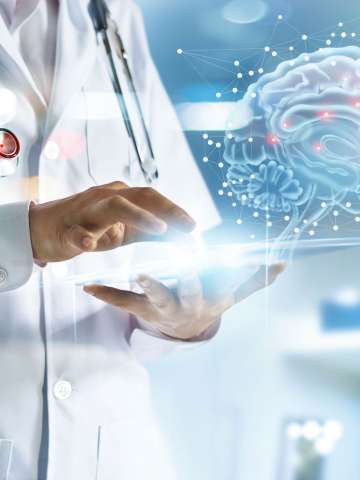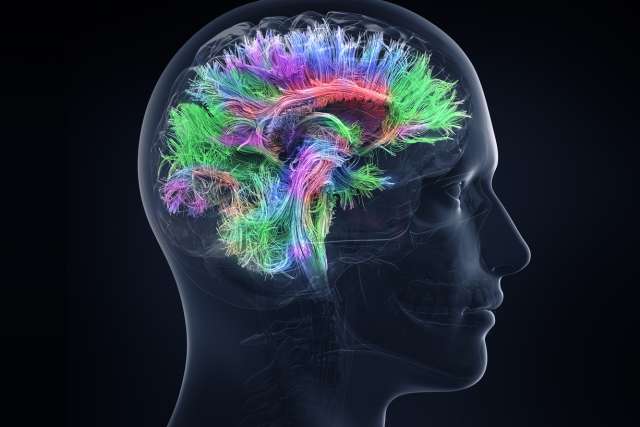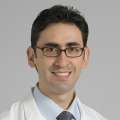Neurocritical Care
The neurocritical care team offers 24/7 treatment in our neurointensive care unit (neuro ICU). We use the latest technologies to provide lifesaving care.

UCLA Health approach to neurocritical care
Through the Neurocritical Care Program, we offer emergency stabilization and treatment for patients with life-threatening neurological disorders or complications. Our neurocritical care physicians staff our neurointensive care unit (neuro ICU) around the clock, offering expert, lifesaving treatment.
Highlights of our program include:
State-of-the-art neuro ICU: Attending physicians certified in neurointensive care lead our 24-bed neuro ICU. Critical care physicians provide 24/7 coverage. A full team of physicians, nurse practitioners and nurses offer continuous bedside care.
Recognized expertise: Our facility is a Level 1 Traumatic Brain Injury Center, meaning we provide the most advanced care available for traumatic brain injuries. As a regional referral center, other physicians and hospitals send patients with the most complex needs to our expert team.
Tools to improve outcomes: We focus on immediate treatment for brain and spinal cord conditions or injuries to reduce the risk of further injury or brain damage. Our specialists use multiple techniques to improve outcomes, such as continuous brain monitoring in the ICU. This continuous monitoring detects silent seizures immediately, which occur in up to 20% of brain trauma patients in comas. UCLA physicians were pioneers in this type of brain monitoring in the ICU.
Our areas of care
Our neurocritical care physicians treat patients through several programs and services, including:
Neuro ICU
The specialists in our 24-bed neuro ICU offer comprehensive specialty care for patients with brain and central nervous system critical illnesses. Our large team of nurses, nurse practitioners, physician fellows and attending physicians offers continuous, 24/7 bedside care.
Cardiac arrest hypothermia service (CAHS)
Our emergency response hypothermia consultation service cares for patients who have had cardiac arrest. We provide hypothermia treatment in our facilities and provide consulting services for patients at other institutions. We use advanced surface and vascular-based cooling catheters for rapid induction of hypothermia. Cooling the body helps reduce brain damage caused by cardiac arrest, which occurs when the heart suddenly stops beating.
Conditions we treat
Neurocritical care physicians treat patients with brain or spinal cord trauma and life-threatening neurological disorders. Conditions we treat in the neuro ICU include:
Encephalitis: Brain inflammation, often due to an infection or immune system disorder
Guillain-Barré syndrome: A rare condition in which the immune system attacks the nerves, often triggered by a viral or bacterial infection
Intracerebral hemorrhage: A burst blood vessel that causes bleeding inside the brain
Myasthenia gravis: An autoimmune disorder causing muscle weakness and fatigue due to communication breakdown between nerves and muscles
Seizures: Sudden and uncontrollable disruptions in the brain’s electrical activity, sometimes causing loss of consciousness
Spinal cord injury: Damage to the spinal cord, which contains nerves and cells that carry messages between the brain and the rest of the body
Status epilepticus: A medical emergency that occurs when a seizure lasts longer than five minutes, or more than one seizure occurs within five minutes
Stroke: A medical emergency that occurs when blood supply to the brain is interrupted, cutting off oxygen and nutrients to the brain
Subarachnoid hemorrhage: Bleeding in the subarachnoid space, the area between the brain and the tissue that covers the brain
Tests and procedures we offer
UCLA Health neurocritical care specialists use the latest brain monitoring and imaging tools. We provide comprehensive care, including treatments available through clinical trials.
Brain monitoring and imaging
Advanced imaging tools we use in the neuro ICU include:
Computed tomography (CT) scans: A brain CT scan uses specialized X-rays and computers to view brain tissue and structures.
Magnetic resonance imaging (MRI): An MRI of the brain uses magnets and radio waves to view brain tissues and structures.
Positron emission tomography (PET) scan: A brain PET scan uses a special dye called a radiotracer to show brain tissue and activity. It may be combined with a CT scan or MRI.
Brain monitoring in the neuro ICU includes:
Cerebral microdialysis: A thin, hollow tube (catheter) connects the brain to a bedside monitor that assesses certain brain chemicals.
Electroencephalogram (EEG): Small, metal discs called electrodes are attached to the scalp to measure electrical activity in the brain. Continuous EEG (cEEG) detects silent seizures. UCLA Health neurocritical care specialists pioneered this monitoring technique in the neuro ICU.
Depth EEG: Electrodes are surgically attached to the brain to measure brain wave activity.
Evoked potentials: Electrodes are attached to the scalp to measure how quickly and accurately nerve signals reach the brain.
Intracranial pressure monitoring: A device is surgically placed underneath the skull to measure pressure inside the skull.
Transcranial Doppler ultrasound: This test uses soundwaves to evaluate how blood flows through the brain (cerebral blood flow).
Treatments we offer
Neurocritical care treatments may include:
Clinical trial drug treatments: Our specialists continually study the newest treatment options for brain injuries. Eligible patients may take new medicines through participating in clinical trials.
Intraoperative stereotactic CT-guided endoscopic surgery: Surgeons deliver a clot-busting medicine to the brain through a catheter to stop a brain hemorrhage.
Stereotactic radiosurgery: Stereotactic radiosurgery uses focused, highly concentrated beams of radiation to shrink or destroy tumors or treat other problems such as a brain hemorrhage.
Therapeutic hypothermia: We may intentionally reduce a patient’s core body temperature to lower intracranial pressure and reduce the risk of brain damage and other neurological complications.
Our expert team
Our neurocritical care team provides expert, lifesaving care. We use a range of advanced technologies and treatments, including through clinical trials.
Director
Faculty
Contact us
Call 310-825-6301 to speak with the on-call neurocritical care specialist at UCLA Health.
Find your care
Our neurocritical care specialists offer expert, lifesaving care. To learn more about our services, call 310-794-1195.


